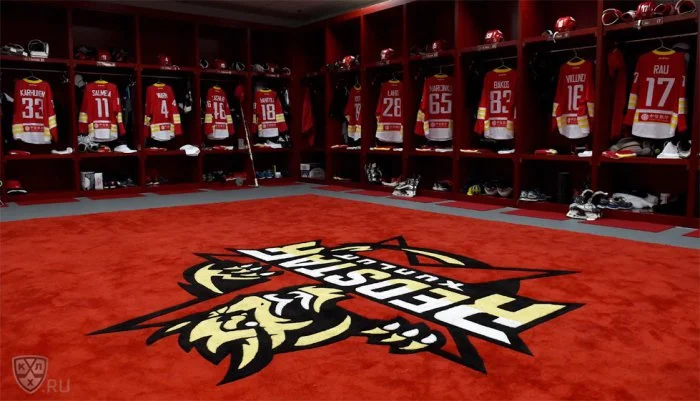SHOW ME THE MONEY
Sport-Express sent shockwaves through the KHL when it released the salaries of Yekaterinburg’s point machine, HK Avtomobilist. In the NHL, a salary release is hardly news unless it is record-breaking; disclosure is common practice, and helps to keep teams accountable according to Canadian hockey reporter Steve “Dangle” Glynn.
Steve is a multi-platform commentator focused on the Toronto Maple Leafs. His passion project turned into a full-time job, and he even voiced highlights for the KHL during the 2012-13 NHL lockout. Steve’s new book, This Team Is Ruining My Life (But I Love Them): How I Became a Professional Hockey Fan, chronicles his meteoric rise in a changing sports media landscape, and will be published in early 2019. He shares his take on the merits of public salaries, Avtomobilist’s reaction and more with me for Sport-Express.
Gillian Kemmerer (GK): How do you interpret the release of hockey players’ salaries? Is it a matter of public interest?
Steve ‘Dangle’ Glynn (SDG): It’s maybe less a matter of public interest and more for NHL teams because of the hard salary cap. I am definitely curious, and I am sure players around the world are curious, because the KHL is a legitimate hockey option. The issue over the years that we’ve heard from many players is that the number they agree to isn’t always the number that they get. So even if the numbers are released, they do not necessarily mean what they say.
GK: So in this view, the release of salaries could hold KHL teams more accountable to their own rosters?
SDG: That strikes me as the best part of it. Once the number is out there, it puts the pressure on the team to do good by their word.
GK: When you’re reporting, what interests you most about the NHL salary disclosures?
SDG: I am still fascinated by the fact that there’s a salary cap, and every single time they change the rules a little bit, teams find new ways to bend them.
[Toronto Maple Leafs center] John Tavares is a good example of that. There were all sorts of things that the Toronto Maple Leafs put into place to get him - that as far as I know were above board and legal. In [his] next agreement, the NHL might come up with ways to restrict the Leafs. They’ll have to think of something else…I’m also always amazed by how salaries don’t match the cap hit.
These numbers being publicly available helps to keep teams honest, but they do not always necessarily do that.
GK: But would there be value in publishing salaries to the league itself?
SDG: I think there would be value. Beyond holding teams accountable, I think it is another piece of information that fans can consume. A more informed fan base is probably a more passionate fan base. What KHL team wouldn’t want more fans showing up to games and buying their jerseys and paying for their team to succeed?
GK: The club Avtomobilist did not share this sunny view, unsurprisingly! They summarized the leak as a violation of KHL regulations and basic human ethics. Do you agree with this?
SDG: A journalist’s job is to be a journalist, and dig up secrets. Terribly sorry, Avtomobilist, but that is the way it is.
They can be mad at whoever leaked the information, but they may want to ask what motivated the leak [in the first place]. The first thing I think when I hear a story like this is: well maybe they were not being true to their players. I don’t know that to be true, but when I see how furious they got…if there is nothing to hide, why are you so upset that this is out there?
GK: You have to wonder about the impact on their bargaining position, for better or for worse—particularly as the KHL competes with other European leagues for talent.
SDG: You would think that the salaries being out there would be a good thing. If they’re obviously higher than other leagues, it just makes the KHL that much more of a clear option.
Maybe they don’t like that the information is out there because it’s beneficial to the players. For example, some of the best players in the NHL back in the day—I think it was Gordie Howe or Bobby Orr—their salary set the standard. And Gordie Howe notoriously received a team jacket as his signing bonus. He was way underpaid because he did not know what his peers were making.
When you enlighten players, you make life more difficult for teams. But it shouldn’t be viewed as that. It should be viewed as being fair to the players. They deserve to be paid what they deserve to be paid.
GK: You have a new book coming out, and in it you discuss your experience working with the KHL. Can you give us a preview?
SDG: You have to understand that as a North American, working for the KHL can be somewhat of an adventure. I enjoyed what I did and genuinely loved it - I want that to be known. But like so many other North American players, there were money issues.
I discovered that they were not paying me in full, and it took forever to get paid. They wanted me to fill out forms, but I said, “you paid me without the forms before.” They told me that they did it for me as a favor. I was able to deal with it at the time…but now I have a mortgage and a wife, and I could not be bothered with that worry.
You can find Steve on Twitter, Instagram and Sportsnet.
A Russian version of this article first appeared on Спорт-Экспресс under the title, "Ужасно жаль, ‘Автомобилист, но такова жизнь’. Взгляд из Канады на публикацию зарплат лидера КХЛ.”







